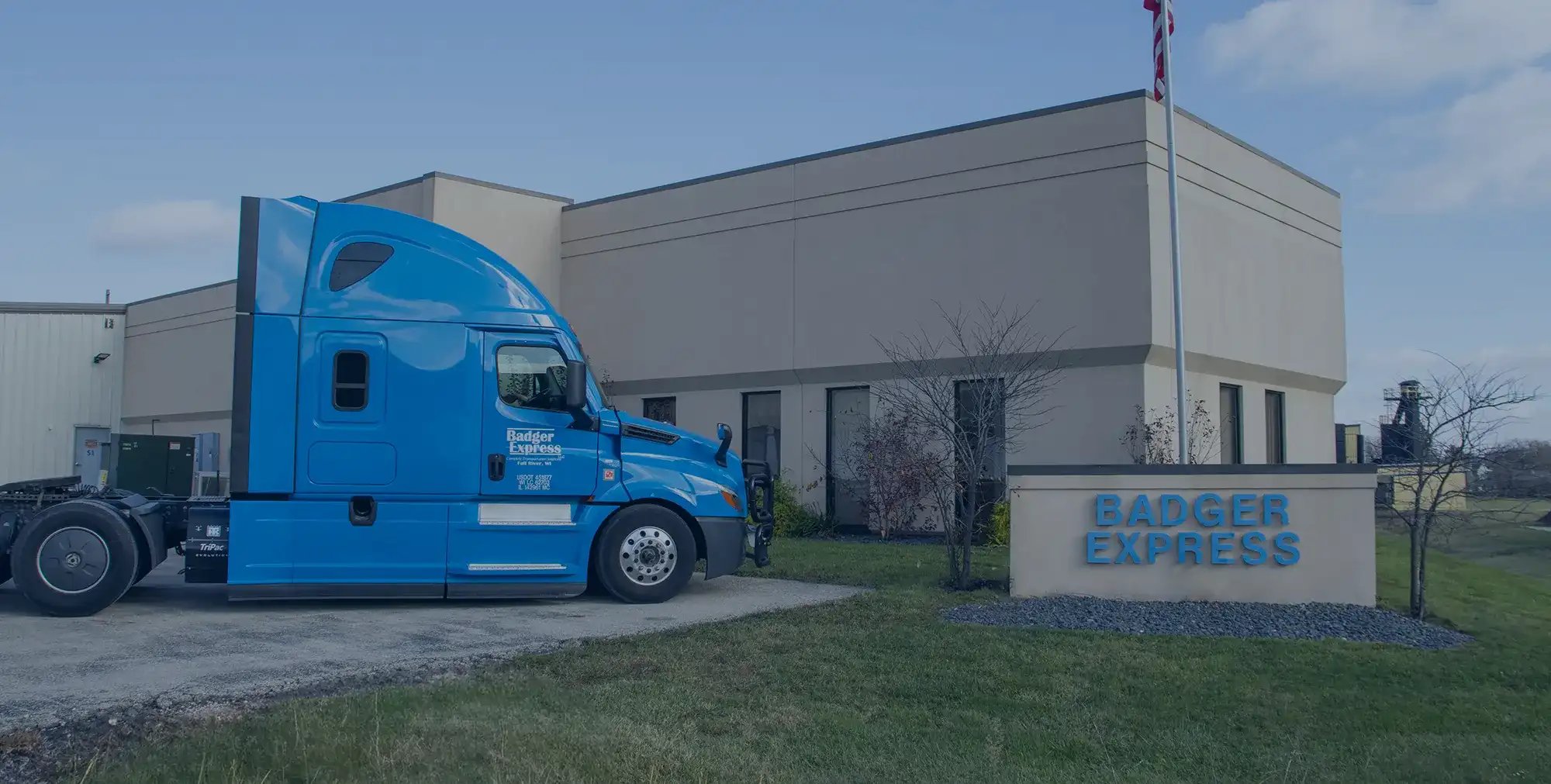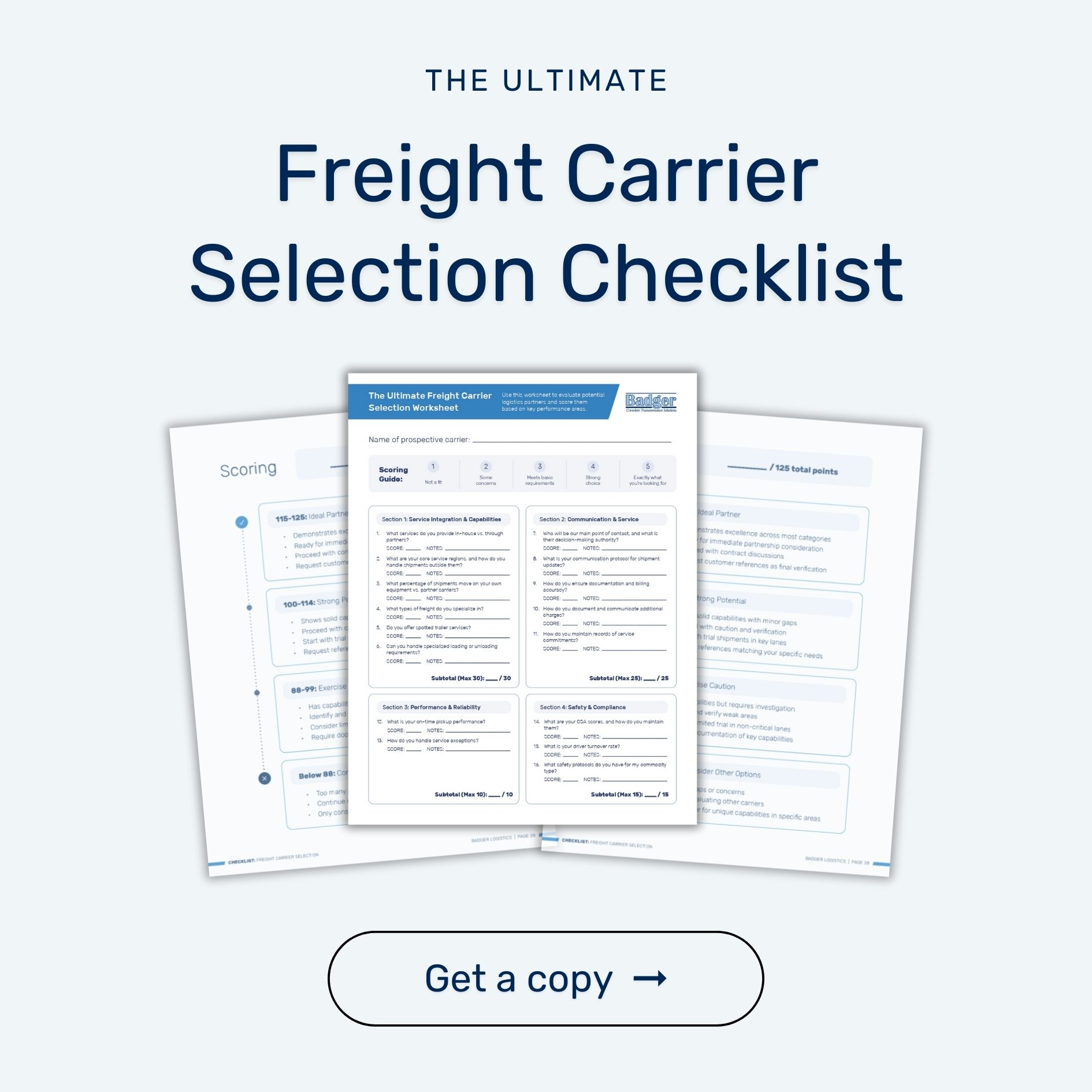A brief introduction
After 15+ years in the transportation industry, I've noticed a clear pattern among shippers who consistently outperform their competition: they've moved away from fragmented logistics solutions toward integrated providers who can handle multiple aspects of their supply chain.
This shift isn't just about convenience — it fundamentally transforms how businesses manage their freight and respond to market challenges.
When I talk with prospects about what Badger Logistics offers, I often explain that we're not just another broker or carrier — we're a comprehensive logistics partner combining asset-based trucking, brokerage services, and warehousing under one roof. This integrated approach has helped hundreds of Wisconsin manufacturers and distributors streamline their operations in ways that simply aren't possible when working with siloed providers.
Let me walk you through when this approach makes sense, and when it might not be the right fit for your operation.
What is integrated logistics in 2025?
The traditional approach to logistics often involves juggling multiple providers:
- An asset carrier for your consistent lanes.
- A broker for lanes outside your primary carrier's network.
- A warehouse provider for inventory management.
- Possibly a service center for equipment maintenance.
Each relationship requires separate contracts, different points of contact, unique billing systems, and incompatible visibility platforms. This fragmentation creates inefficiencies that ripple through your entire supply chain. An integrated provider consolidates these services.
|
In our case at Badger Logistics, we combine:
|
This integration unlocks several key advantages that fragmented approaches simply can't match.

When integrated logistics delivers the most value
I usually boil this down into 4 things. Let's run through them quickly to see if you're a match.
1. When you need flexible capacity
One of the most powerful aspects of working with an integrated provider is capacity flexibility. I see this play out regularly with our Wisconsin customers who have varying shipping needs throughout the year.
Here's how it typically works: We might use our Badger Express assets for your consistent, predictable lanes where we can guarantee capacity. But when you need to ship to areas outside our asset network or during volume spikes, we seamlessly shift to our brokerage division without you needing to make a single phone call to another provider.
We begin by presenting all our options. We lay everything out clearly: warehousing, asset-based trucking, and brokerage. Which services suit your needs? Do you require one, two, or all three?
This flexibility becomes particularly valuable during market disruptions. When capacity tightens, we can prioritize our asset equipment for our integrated customers while still providing brokerage solutions for their expanded needs.
2. When your operations require specialized coordination
Manufacturers with complex logistics requirements often benefit most from integrated solutions. For instance, one of our Wisconsin paper customers uses all three of our service divisions in a coordinated approach:
|
The coordination between these services creates significant efficiencies. As one example, we can pre-load trailers at our warehouse so there's no wait for drivers. We can preload the trailers so there's no wait for a driver. He hooks and he leaves.
This level of coordination is nearly impossible to achieve when working with separate providers who don't have visibility into each other's operations.
3. When you value relationships over just transactions
In transportation, relationships matter enormously. The deeper the relationship, the better the service. Working with an integrated provider allows you to build one meaningful partnership rather than managing multiple transactional relationships.
When you're a purely transactional shipper focused exclusively on rate, this might not matter much. But for shippers who value consistent, reliable service — especially when problems inevitably arise — the relationship advantage becomes critical.
The reality is that problems happen in transportation — equipment breaks down, weather disrupts routes, and receivers change appointment times. When these issues arise, having a single point of contact who understands your business comprehensively leads to faster, more effective solutions than calling separate providers who each only see one piece of the puzzle.
4. When you need inventory flexibility with transportation integration
For manufacturers with variable production schedules or seasonal demands, the warehouse-transportation integration offers particularly compelling advantages.
Consider what happens when you suddenly need to clear your production floor but your customer isn't ready to receive: we can shuttle product to our warehouse, store it until needed, and then deliver when the time is right — all without you needing to coordinate between separate providers.
This capability is especially valuable for Wisconsin manufacturers dealing with seasonal production cycles or limited dock space. As I've seen repeatedly, the ability to shift product between your facility, our warehouse, and your customers creates a buffer that keeps operations flowing smoothly despite inevitable market disruptions.
When a single-source provider might not be right
Integrated logistics isn't necessarily right for every shipper. You might be better off with specialized providers when:
|
Finding the right balance
Many shippers find that a hybrid approach works best: using an integrated provider for the core of their shipping needs while maintaining relationships with specialists for unique requirements.
In these cases, we often become the primary logistics partner handling 70-80% of a customer's needs, while they use specialists for the remainder. This approach gives them the best of both worlds—the efficiency and relationship advantages of integration alongside specialized expertise when needed.
The technology factor
One common misconception is that sophisticated technology platforms can eliminate the need for integrated providers. While technology certainly helps coordinate between disparate providers, it can't replicate the operational integration that happens when services are truly united under one roof.
At Badger, we've found that our relatively straightforward systems combined with deep human relationships actually outperform the sophisticated technology platforms of larger providers who lack that integration. As one customer told us, "I trust Badger with most of my regional loads because I know their team is going to deliver on time and keep the handling of my freight their top priority."
Getting started with integrated kogistics
If you're considering a more integrated approach to your logistics, start with these steps:
|
For Wisconsin and Midwest shippers especially, the regional knowledge and proximity of a provider like Badger Logistics often delivers additional advantages that national providers can't match.
The bottom line
The value of integrated logistics isn't just about simplifying your vendor relationships — it's about creating a more resilient, responsive supply chain. When your warehousing, trucking, and brokerage operations work together seamlessly, you gain flexibility that translates directly to competitive advantage.
As I often tell prospects, our goal isn't just to move your freight from A to B — it's to become an extension of your business, with all the flexibility, responsiveness, and coordination that implies.
For manufacturers and distributors dealing with today's complex logistics challenges, that integration can make all the difference between merely surviving and truly thriving.
Talk to us for a fully integrated logistics experience

At Badger Logistics, we combine asset-based trucking with extensive brokerage capabilities, warehousing, and maintenance services to provide integrated logistics solutions for Wisconsin shippers. This guide reflects not just my personal experience but the collective wisdom of our team, which brings over a century of combined Wisconsin logistics experience to every shipment we handle.
While freight transportation will always involve challenges, the right approach and partnerships can transform logistics from a constant struggle into a sustainable competitive advantage. I hope this guide helps you navigate Wisconsin's unique shipping environment more effectively.
For specific questions or to discuss your particular freight challenges or to get a competitive quote, feel free to reach out directly or submit the quote request form below. We'll be in touch within one business day.





